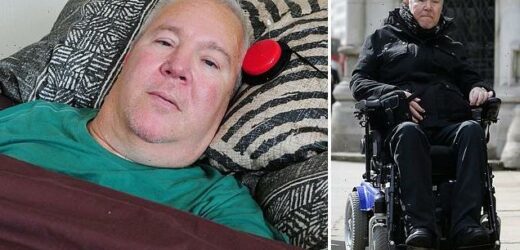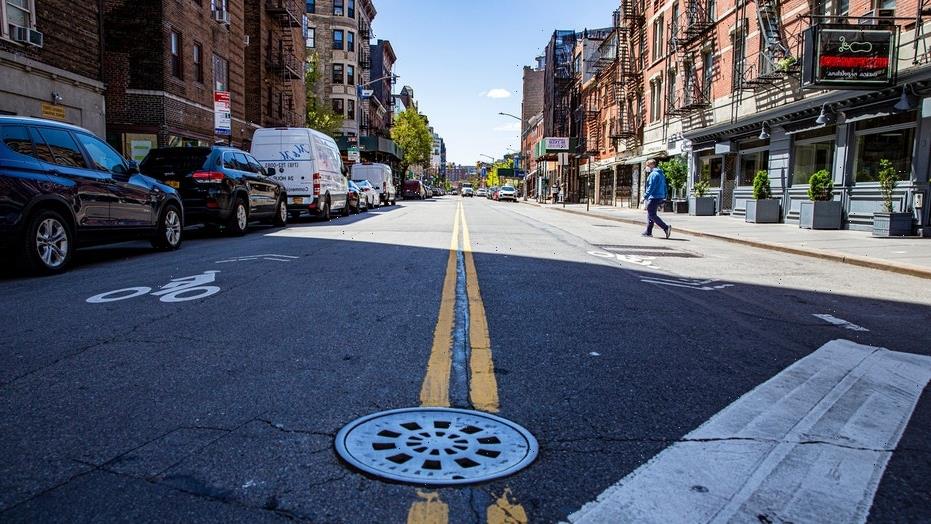Assisted dying campaigner who was paralysed from neck down after car crash and was in pain every day has died in hospital aged 65
- Paul Lamb, from Leeds, died in hospital on Tuesday, announced Humanists UK
- Carer said she is ‘shocked’ by death, which is believed to be from natural causes
- He spearheaded a legal bid aimed at changing the law on assisted dying in 2014
- Humanist UK’s chief said Mr Lamb will leave a ‘fierce legacy of campaigning’
An assisted dying campaigner who was left paralysed from the neck down after a car crash and was in pain every day has died in hospital aged 65.
Paul Lamb, from Leeds, West Yorkshire, who took on several legal challenges including one at the Supreme Court, died in hospital on Tuesday, announced Humanists UK.
Mr Lamb’s carer Francesca Hepworth said she is ‘shocked’ by his death, which is believed to be from natural causes, but expressed relief that he is ‘finally at peace’ after suffering from chronic pain as a result of the car crash in 1990.
The former builder and greyhound racer was left with no function from the neck down aside from limited movement in his right arm and required 24-hour care.
Ms Hepworth said: ‘Paul’s death has been a shock to us all, but I’m glad he is finally at peace. For years, Paul grappled with his condition and faced increasing pain, discomfort, and distress.
Paul Lamb (pictured in 2013), from Leeds, who took on several legal challenges including one at the Supreme Court, died aged 65 in hospital on Tuesday, announced Humanists UK
‘I know Paul was resolute in his belief that nobody should be forced to suffer, and determined to keep fighting to change the law on assisted dying.
‘I only regret that he now won’t be able to see such a choice realised, if the law were to change.
‘I’m proud to have known him, and been able to call such a brave and courageous man my friend. I am going to miss him.’
Humanist UK’s chief executive Andrew Copson said Mr Lamb will leave a ‘fierce legacy of campaigning’.
He said: ‘Paul Lamb was a tireless advocate for the right to die who dedicated his life to championing choice for those with terminal or incurable illnesses.
‘He leaves behind a fierce legacy of campaigning, which we are determined to continue in his honour.’
Mr Lamb said the law in England, Wales and Northern Ireland, where assisting a suicide is a crime punishable by up to 14 years in prison, ‘condemns me to a life of constant pain, and removes the small part of my life that I could still have some say over – how I want to die’.
He was the patron for Humanists UK and spearheaded a legal bid aimed at changing the law in 2014 at the Supreme Court.
The former builder and greyhound racer (pictured arriving at the Royal Courts of Justice on May 13, 2013) was left with no function from the neck down aside from limited movement in his right arm and required 24-hour care
Humanist UK’s chief executive Andrew Copson said Mr Lamb (pictured in an undated handout file photo) will leave a ‘fierce legacy of campaigning’
Mr Lamb took on the case from fellow activist Tony Nicklinson, who began the campaign at the High Court in 2012 and died days after losing this bid.
Along with Mr Nicklinson’s widow Jane, Mr Lamb lost the case but secured an agreement from some judges at the UK’s highest court that Parliament should be given the opportunity to reconsider the law.
MPs voted against the Assisted Dying Bill in 2015, though this would not have helped Mr Lamb (above, in London in 2013) as it only applied to the terminally ill
MPs voted against the Assisted Dying Bill in 2015, though this would not have helped Mr Lamb as it only applied to the terminally ill.
Following the Supreme Court ruling, Mr Lamb said: ‘I cannot understand, in a civilised society like ours, why I should be forced to suffer when millions of people around the world already have the choice I asked for.
‘Throughout my case, all I have been told is how sympathetic others are to my situation. But I have never wanted anyone to pity me.
‘All I have ever wanted is for my choice to be respected and given equal validity under the law, like everyone else’s.
‘Instead this decision, if it is the final word on the matter, condemns me to a life of constant pain, and removes the small part of my life that I could still have some say over – how I want to die.’
In 2020, the Court of Appeal refused him permission to bring a fresh case, ruling that assisted dying was ‘pre-eminently a matter for Parliament, and not the Courts’.
Mr Lamb said he was ‘devastated’ by this ruling which left him in a ‘powerless position’ and wrote to Justice Secretary Robert Buckland calling for an inquiry into assisted dying in November.
Mr Lamb took on the case from fellow activist Tony Nicklinson (file photo, above), who began the campaign at the High Court in 2012 and died days after losing this bid
In 2020, the Court of Appeal (file photo, above) refused Mr Lamb permission to bring a fresh case, ruling that assisted dying was ‘pre-eminently a matter for Parliament, and not the Courts’
Trevor Moore, Chair of My Death, My Decision, which supported the campaigner’s fresh case, said: ‘The team at My Death, My Decision send their heartfelt condolences to Paul Lamb’s family and to everyone who knew and loved him.
‘We are honoured to have had Paul as a much-valued patron who inspired so many people to support the campaign for a compassionate law on assisted dying. He will be greatly missed.
‘Paul faced considerable challenges with unrelenting courage, despite his evident suffering.
‘Through it all, he remained committed to achieving a law that would allow an assisted death not only to the terminally ill, but also to those suffering incurably, as Paul did.
‘We will carry forward his legacy by campaigning with renewed vigour for the law that Paul so tirelessly sought. That is why we continue to press for a public inquiry, now long overdue.’
Source: Read Full Article








